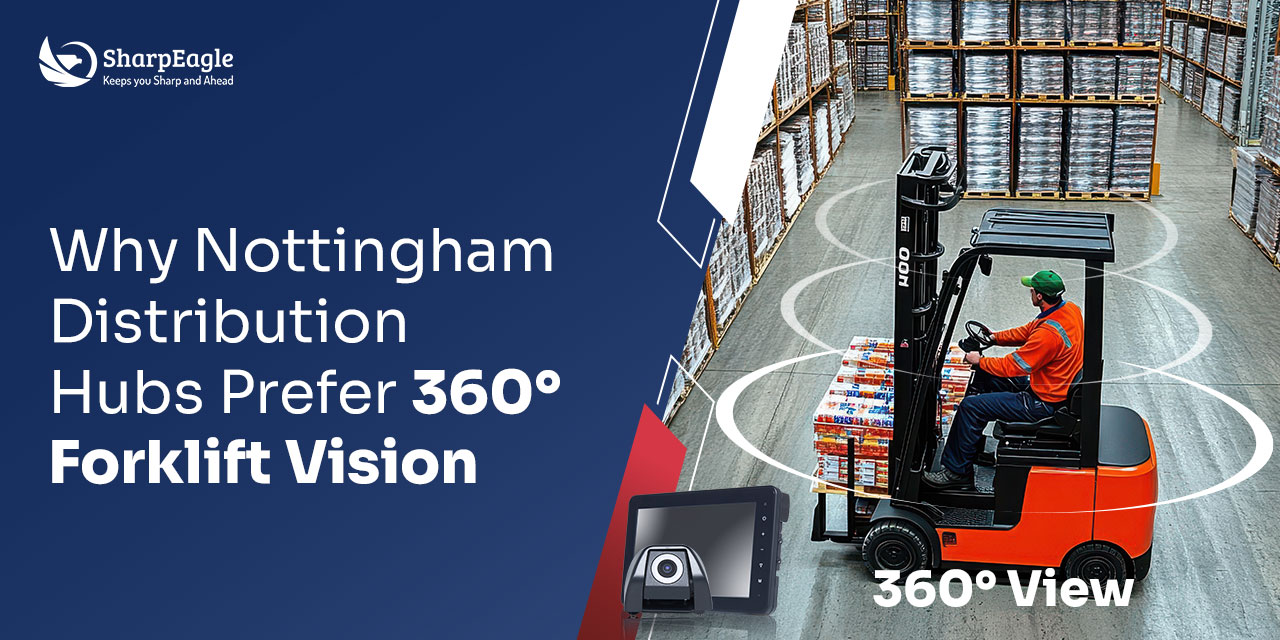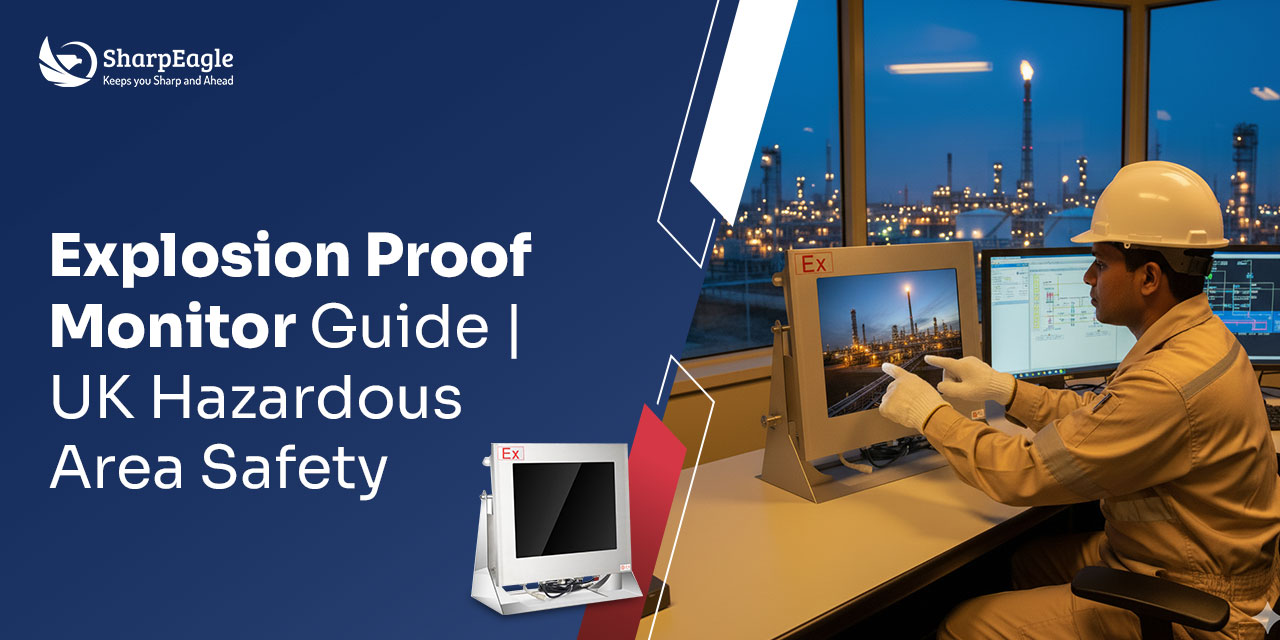

Explosive atmospheres in British workplaces, such as refineries, chemical plants, and manufacturing sites, can cause deadly accidents. Gases, vapours, or dust in these places can catch fire or explode, leading to loss of life and major damage. According to the Health and Safety Executive (HSE), there are around 138 work-related fatalities annually in the UK. The Dangerous Substances and Explosive Atmospheres Regulations (DSEAR) require companies to remove ignition risks in these zones. A regular camera can overheat or spark, which may cause an explosion.
An Ex Proof CCTV System is the safe choice for these high-risk areas. Designed to stop sparks or heat from escaping, this system is vital for hazardous area surveillance in the UK. Each ex proof CCTV camera is made to meet strict safety standards, giving 24/7 monitoring without adding risk. Industries like oil and gas use these cameras to stay safe, follow the law, and protect their workers from preventable disasters.
Explosion resistant cameras differ dramatically from ordinary security equipment through their unique construction methods. Regular CCTV units create heat spots exceeding 150°C and produce electrical arcs that easily ignite volatile substances. Chemical plants, oil and land rigs, and paint manufacturing facilities cannot use standard cameras because they become deadly hazards in environments where flammable materials are present.
Ex proof cameras use sealed metal housings made from special alloys that contain any internal explosions. When electrical faults occur inside the camera, the reinforced casing prevents flames or hot gases from escaping into the surrounding atmosphere. These protective shells also block moisture and dust from entering delicate electronics, preventing the corrosion and contamination that causes equipment failures in harsh industrial settings.
ATEX and IECEx testing laboratories subject these cameras to extreme conditions, including exposure to explosive gas mixtures and high-temperature environments. Cable connections use threaded fittings with gasket seals that maintain airtight barriers against hazardous atmospheres. Advanced cooling systems dissipate heat through the camera housing without creating external hot spots that could ignite nearby combustible materials. These safety features make ex proof cameras essential for hazardous area surveillance UK operations.
Pro Tip 1: Check certification labels before installing any surveillance equipment in classified zones. Proper ATEX or IECEx markings confirm compliance with UK safety requirements.
British industrial sites operate under strict ATEX classifications that define explosion risks based on the likelihood and duration of hazardous atmospheres. Zone 1 areas contain flammable gases regularly during normal operations, whilst Zone 2 locations experience occasional exposure to volatile substances. Dust-producing facilities fall under Zone 21 or 22 classifications depending on the frequency of combustible particle clouds.
Traditional cameras become ignition sources that can kill workers and destroy facilities worth millions of pounds. Circuit boards generate sufficient heat to ignite methane, whilst LED lighting systems produce electrical arcs during power fluctuations. Even minor equipment malfunctions can trigger catastrophic chain reactions that result in multiple fatalities and devastating facility damage that takes years to rebuild.
Read here: What Makes Ex Proof CCTV System Ideal for Hazardous Areas
Selecting surveillance equipment for British hazardous environments requires understanding specific technical characteristics that ensure safe operation under extreme industrial conditions.
Testing laboratories evaluate explosion-resistant equipment through rigorous procedures that simulate real-world hazardous conditions. ATEX certification covers European markets, whilst IECEx provides global recognition for equipment exports. These certifications require cameras to withstand internal explosions without allowing flames or hot gases to escape their protective housings.
HSE compliant CCTV systems carry detailed documentation that proves conformity with British workplace safety standards. Certificate markings specify temperature ratings, gas group classifications, and approved deployment zones. Companies that purchase uncertified equipment face regulatory violations, substantial fines, and potential criminal charges if accidents occur due to non-compliant installations.
Industrial environments expose surveillance equipment to temperature extremes, corrosive chemicals, mechanical vibration, and weather conditions that quickly destroy standard cameras. Ex proof units feature IP66 or IP67 ratings that prevent water penetration and dust ingress into sensitive electronic components. Marine-grade stainless steel resists damage from acids, alkalis, and organic solvents commonly found in processing plants.
Vibration-resistant mounting systems absorb shocks from heavy machinery without damaging delicate optical assemblies or circuit boards. Components function reliably across temperature ranges from -40°C to +60°C, accommodating both refrigerated storage areas and high-temperature production zones. These construction methods ensure continuous operation despite environmental challenges that disable conventional equipment within months of installation.
Modern explosion-resistant cameras incorporate sophisticated technology that enhances surveillance effectiveness without compromising safety requirements. Remote pan-tilt-zoom controls allow operators to adjust camera positions from secure control rooms, eliminating personnel exposure to hazardous atmospheres during routine monitoring activities. An explosion proof PTZ camera provides comprehensive coverage through programmable sweep patterns and preset viewing angles.
Night vision capabilities enable clear imaging in poorly lit areas, whilst thermal sensors detect heat signatures that indicate equipment malfunctions or process irregularities. High-definition recording captures detailed evidence for incident investigations and regulatory compliance documentation. Wireless connectivity allows real-time monitoring from remote locations, enabling immediate responses to developing emergency situations.
Professional installations connect explosion-resistant surveillance with existing safety infrastructure, including gas detection systems, fire suppression equipment, and automatic shutdown controls. Integrated monitoring triggers immediate responses to dangerous conditions, such as activating ventilation fans when gas concentrations approach explosive levels or initiating facility-wide evacuation procedures during emergencies.
Network-based systems transmit live video feeds to central monitoring stations where trained operators assess situations and coordinate emergency responses. Automated alert functions notify relevant personnel instantly when cameras detect unusual activities or equipment anomalies that require immediate investigation and corrective action.
Ex Proof CCTV Systems deliver substantial advantages for British companies handling hazardous materials in their daily operations.
Remote monitoring eliminates personnel exposure to toxic gases, flammable vapours, and explosive dust clouds that pose serious health risks. Surveillance systems provide continuous visibility into dangerous processes without requiring workers to enter hazardous zones for routine inspections. This separation between personnel and dangerous atmospheres significantly reduces accident rates in facilities that historically experience higher injury frequencies.
Supervisors can observe safety compliance from secure locations, ensuring workers follow established procedures whilst maintaining safe distances from potential hazards. Real-time monitoring enables immediate intervention when unsafe practices are observed, preventing accidents before they occur rather than responding after injuries happen.
British companies operating in classified areas must demonstrate adherence to multiple regulatory frameworks including DSEAR, ATEX, and HSE workplace standards. Using HSE compliant CCTV provides documented evidence of compliance that satisfies inspection requirements and legal obligations. Certified installations demonstrate corporate responsibility whilst avoiding severe penalties imposed for regulatory violations.
Explosion proof CCTV HSE standards specify technical requirements that surveillance systems must meet for legal deployment in British industrial facilities. Proper documentation protects companies during regulatory audits whilst providing legal defence against liability claims arising from workplace incidents.
Ex proof cameras eliminate ignition sources that historically trigger devastating explosions in volatile environments. Sealed electrical components prevent spark generation, whilst temperature-controlled housings avoid creating hot surfaces that ignite flammable materials. This fundamental improvement protects workers' lives and prevents facility destruction that costs millions in reconstruction expenses.
Early warning capabilities detect developing hazardous conditions before they reach critical thresholds. Surveillance systems identify equipment overheating, chemical accumulation, or process irregularities that might otherwise progress undetected until dangerous situations develop beyond control.
Continuous monitoring provides management with comprehensive oversight of critical processes, storage areas, and production equipment that directly impact efficiency and quality outcomes. Detailed surveillance records support optimisation efforts by identifying bottlenecks, maintenance requirements, and operational inefficiencies that affect productivity and profitability.
24-hour coverage enables rapid responses to equipment failures, minimising downtime and preventing minor issues from escalating into major production disruptions. Visual documentation assists with performance analysis, maintenance scheduling, and improvement initiatives that enhance overall facility effectiveness.
Insurance companies recognise risk reduction achieved through certified explosion proof camera manufacturers installations, often providing premium discounts for facilities demonstrating enhanced safety measures. Reduced accident frequency translates to lower compensation claims, whilst improved safety records positively influence policy renewals and coverage terms.
Preventing major incidents avoids enormous costs associated with facility reconstruction, production delays, regulatory fines, and legal settlements that typically follow industrial accidents. Investment in proper surveillance represents sound financial planning that protects against catastrophic losses whilst supporting sustainable long-term operations.
Pro Tip 2: Implement scheduled maintenance programmes for ex proof cameras to preserve safety certifications and maintain optimal performance in demanding environments.
Ex Proof CCTV Systems serve critical functions across diverse British industrial sectors where explosion hazards require specialised monitoring solutions.
Several factors influence selection of appropriate surveillance equipment for safe, compliant British industrial applications.
Ex Proof CCTV systems play a very important role in keeping UK workplaces safe, especially in areas where there is a risk of explosion. These special cameras are built to be strong, use smart technology, and follow strict safety rules. By using explosion proof CCTV systems that meet ATEX and HSE compliant CCTV standards, UK industries can achieve UK industrial safety compliance while protecting workers and buildings from fires or explosions. It is also important to buy these systems from certified explosion proof camera manufacturers and trusted UK manufacturers, so they work well for your site’s needs.
HSE reports confirm that strong risk management and monitoring in hazardous areas significantly reduce incidents and enhance safety compliance. These CCTV systems allow businesses to watch risky areas all the time, spot dangers early, and avoid costly downtime. An explosion proof PTZ camera also allows flexible viewing of large zones. This improves safety, saves money, and shows a company cares about protecting its workers. SharpEagle is a trusted name for top-quality Ex Proof CCTV systems in the UK.
Ex proof refers to explosion proof CCTV systems designed for safe operation in hazardous environments where flammable gases, vapours, or dust create explosion risks. These ex proof CCTV cameras incorporate safety features preventing ignition whilst meeting ATEX and IECEx certification requirements. Proper certification ensures safe deployment for hazardous area surveillance UK applications supporting UK industrial safety compliance.
British legislation mandates certified Ex Proof CCTV Systems in classified hazardous zones under DSEAR and related safety regulations. HSE compliant CCTV standards specify equipment requirements preventing surveillance systems from creating ignition sources in explosive atmospheres. Explosion proof camera compliance UK ensures worker protection whilst helping companies meet explosion proof CCTV HSE standards and avoid regulatory penalties.
Standard cameras lack safety certifications and protective features required for explosive atmosphere deployment. Non-compliant equipment creates ignition risks violating safety regulations and endangering personnel. Only certified explosion proof cameras from approved UK manufacturers and explosion proof camera manufacturers meet ATEX and IECEx standards for safe hazardous area surveillance UK operations.
Protect facilities through certified Ex proof CCTV systems designed for UK industrial requirements with SharpEagle. Our proven HSE compliant CCTV solutions deliver durability, regulatory compliance, and advanced monitoring capabilities for hazardous operations. Contact SharpEagle today to secure workforce and assets through partnerships with trusted UK manufacturers.



